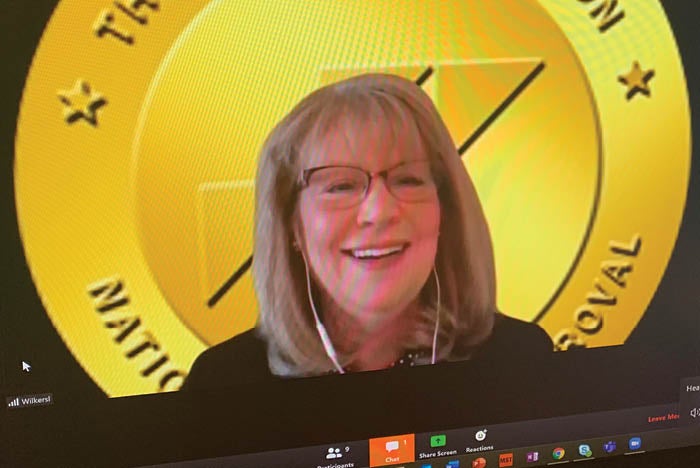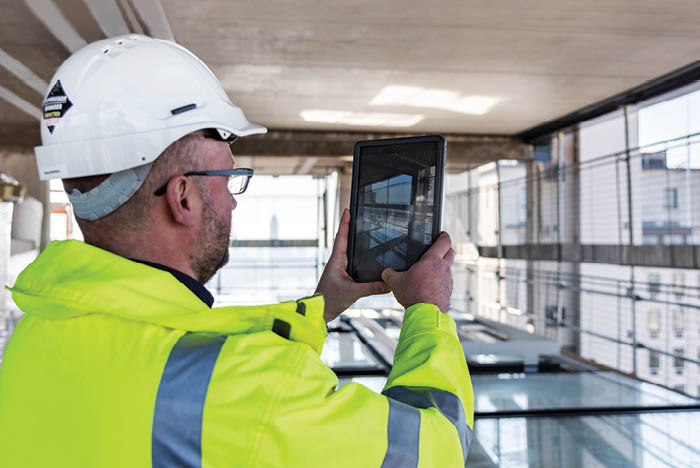Accreditation surveys benefit from virtual practices, too

Joint Commission Surveyor Linda Wilkerson conducts a virtual accreditation survey.
Image courtesy of The Joint Commission
Organizations seeking certification by the Centers for Medicare & Medicaid Services (CMS) turn to accrediting bodies for the regular surveys they need to conduct and pass. However, like code inspections, surveys were temporarily put on hold early in the COVID-19 crisis.
But thanks to the ability to perform surveys remotely and virtually, many organizations are compliant again with CMS rules.
The Joint Commission (TJC) began conducting virtual surveys in April, suspending on-site survey and review activity due to the pandemic; on-site surveys and reviews resumed starting June 1 in geographic areas determined to be at lower risk.
“CMS-approved virtual surveys have been helpful to our customers since they have allowed health care organizations that were not previously part of the CMS participation program to become accredited and eligible for payment,” says Tim Markijohn, MHA, CHFM, CHE, field director of surveyor management and support in the Division of Accreditation & Certification Operations at TJC, Oakbrook Terrace, Ill. “Additionally, all organizations we’ve partnered with to conduct virtual surveys have benefited from the best practices and information we’ve been able to share.”
Markijohn notes that, thus far, for hospital, home care, hospice, laboratory and opioid treatment programs, TJC has been granted authority by CMS to provide remote virtual surveys for health care organizations that are seeking initial accreditation as well as ongoing accreditation for opioid treatment programs and laboratories.
“Our organizations have confirmed that our virtual survey process provides a meaningful assessment of risk,” says Lisa DiBlasi Moorehead, MSN, R.N., CENP, associate nurse executive in TJC’s Division of Accreditation & Certification Operations. “In fact, our virtual survey and review process has proven to be as robust as on-site surveys in identifying risk.”
Before conducting a virtual survey, TJC has an in-depth interview with organizations to determine eligibility, including questions about experience with COVID-19 patients and technology capabilities and support. Next, they conduct a dry-run process in advance to test connection and screen sharing. They require documents to be uploaded ahead of the event and reviewed by a surveyor before the start of the virtual survey.
“Once the virtual survey begins, activities are conducted much like during an on-site event,” Moorehead says. “We use the Zoom platform along with Microsoft SharePoint, and our surveyors utilize their regular survey tablets to conduct the virtual survey.”
Milford, Ohio-based DNV GL Healthcare is another health care accreditation and certification body that conducts annual surveys of its member hospitals. President Patrick Horine, MHA, says that, while DNV didn’t know what to expect from its CMS-approved virtual survey process, “it has proven to be very effective so far. Our hospitals have provided a lot of favorable comments to us about the process and their appreciation of our being able to do this remotely.”
DNV surveyors and hospitals primarily rely on Microsoft Teams and Zoom to physically tour the building and communicate. Utilizing accessible electronic records, email, file sharing and screen sharing, surveyors have been able to efficiently review inspection, testing and maintenance documents for hospital fire detection and suppression systems, emergency power, medical gas systems and other areas.
Whitney Hull, R.N., quality manager for DNV-accredited McAlester Regional Health Center in McAlester, Okla., says her facility recently successfully conducted an annual survey remotely.
“We were surveyed to show evidence of correction of last year’s survey findings. Also, several sessions were conducted, including on infection control, quality management systems, emergency services and emergency management, to ensure compliance with DNV and CMS standards,” Hull says.
Kristine Corradetti Smith, R.N., MSN, CPPS, senior director for quality and regulatory at Dallas-headquartered Steward Health Care System, which has 35 hospitals across nine states, also can vouch for the efficacy of virtual surveys.
“Our health care system has completed seven periodic DNV surveys between May and July,” Smith says. “As early adopters of the remote process, we expected some glitches but found that, with careful preparation, an effective and efficient survey experience could be achieved. The remote survey allowed us to continue our periodic visits per our anticipated survey window while minimizing disruption.”





